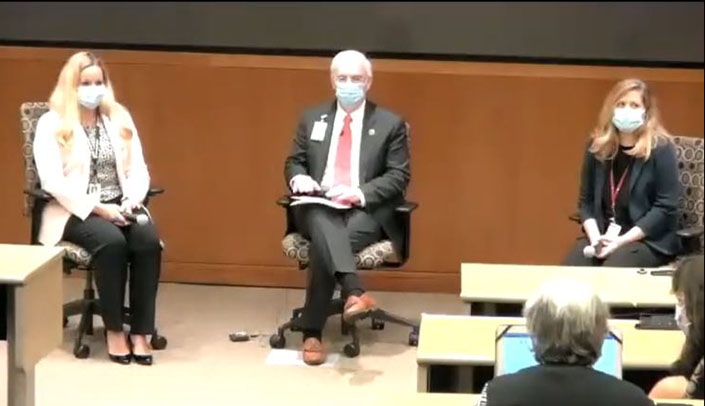As COVID-19 case counts – fueled by the Delta variant and low vaccination rates – rise across the state, UNMC’s campus safety guidelines will be driven by science.
"Our North Star is the safety of our students, faculty and staff on campus," Chancellor Jeffrey P. Gold, MD, emphasized Tuesday during an all-campus forum. "We are going to base our decision-making on the science."
And, the science continues to change, he said, noting updated mask guidance from the Centers for Disease Control and Prevention, new understandings of the novel coronavirus and genetic changes to the virus including the Delta variant, which is now the predominate strain in Nebraska and across the United States.
"We need to be facile, responsive, thoughtful and again use the best science," he said to maintain safe hospital capacity and keep faculty, staff, students and patients safe.
Dr. Gold was joined by Jane Meza, PhD, interim executive director for health security for UNMC and the University of Nebraska at Omaha, and Kelly Cawcutt, MD, an infectious diseases and critical care physician.
Med center leaders continue to review data nationally and internationally to better understand the impact of the more communicable B.1.671.2 (Delta) variant. "We’re not moving in the right direction," Dr. Gold said. "This has increasingly become a Delta variant battle with the nonvaccinated members of our community."
As cases tick upward, national organizations such as the Association of American Medical Colleges, American Medical Association, American Nurses Association, American Academy of Pediatrics and others have issued a call for health care employers to require their employees be vaccinated against COVID-19. The Department of Veterans Affairs also has announced that COVID-19 vaccines are mandatory for Title 38 VA health care personnel.
No campus policy change decisions have been made for UNMC or Nebraska Medicine, but local health care organizations will convene in the near future and discuss a possible communitywide approach to vaccine policy, Dr. Gold said.
Meanwhile, in light of the local campus and statewide COVID transmission and hospitalization changes, Drs. Meza and Cawcutt said med center leaders will review mask policies for nonclinical areas to see if any changes are warranted.
In other matters, Dr. Gold:
- Reiterated the importance of defending and preserving academic freedom, referencing the July 21 statement from NU President Ted Carter and the four university chancellors. The statement defended academic freedom and freedom of expression. "Our job is to teach critical thinking and encourage discussion," Dr. Gold said, noting that Board of Regent Bylaw 4.2 specifically outlines NU’s stance on academic freedom.
- Referenced distribution of COVID-19 vaccine stickers for ID badges, which soon will be sent to all vaccinated faculty, staff and students who have their vaccine status documented in the Health Tracking System.
- Thanked the Nebraska Attorney General’s for the announcement of a historic $26 billion multistate agreement to fight opioid addiction. UNMC has been a member of the coalition to stem opioid abuse and will participate in the next stages of the process.
Dr. Gold likened vaccines to wearing a seat belt, noting how the restraint doesn’t eliminate the need to drive safely. With COVID-19, children under 12 are not yet eligible to get vaccine and immunocompromised individuals remain at higher risk, even when vaccinated, so, vaccinated or not, it’s important to "wear your seat belt and drive carefully," he said.
Said Dr. Cawcutt: "Even if you had COVID-19, the best protection is to get vaccinated and get the full series so you have the highest level of protection."

It would be refreshing if mask policies, as they are reviewed, would not be approached as a 'one size fits all.' I am vaccinated and work in a building that for the most part is empty. The floor on which I work is desolate with the exception of two or three other employees with whom I never have direct contact. It was very frustrating previously when I was the only employee on the floor for almost 16 mos. but technically, according to policy, I had to put on a mask to walk 3 steps to the restroom and 5 steps to the kitchen area never coming into contact with another person. Even now, I rarely see another employee, certainly never have direct contact with them, yet if policies change around masks in non-clinical areas with the 'one size fits all approach,' I am once again in that ridiculous position of being vaccinated and wearing a mask in an area where everyone else is working from home. Please think this through…